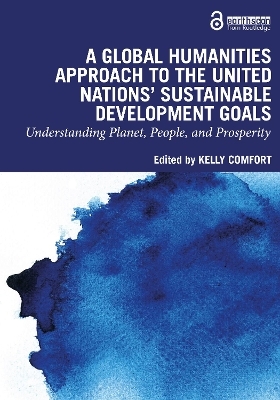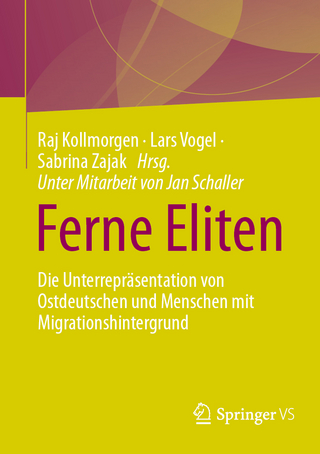
A Global Humanities Approach to the United Nations' Sustainable Development Goals
Routledge (Verlag)
978-1-032-48401-3 (ISBN)
This edited textbook explores the 17 UN SDGs through 12 works from the humanities, including films, novels, and photographic collections. It provides students with the knowledge and understanding of how the humanities engage in broader social, political, economic, and environmental dialogue, offering a global perspective that crosses national and continental borders.
The book takes students through the UN SDGs from a theoretical perspective through to practical applications, first through specific global humanities examples and then through students’ own final projects and reflections. Centered around three major themes of planet, people, and prosperity, the textbook encourages students to explore and apply the Goals using a place-based, culturally rooted approach while simultaneously acknowledging and understanding their global importance. The text’s examples range from documentary and feature film to photography and literature, including Wang Jiuliang’s Plastic China, Kip Andersen and Keegan Kuhn’s Cowspiracy: The Sustainability Secret, Barbara Dombrowski’s Tropic Ice: Dialog Between Places Affected by Climate Change, and Aravind Adiga’s The White Tiger, among others. Providing diverse geographic and cultural perspectives, the works take readers to Argentina, Australia, Bolivia, China, Costa Rica, Ecuador, France, Greenland, Haiti, India, Japan, Peru, Rwanda, Senegal, and the United States.
This broad textbook can be used by students and instructors at undergraduate and postgraduate levels from any subject background, particularly, but not exclusively, those in the humanities. With added discussion questions, research assignments, writing prompts, and creative project ideas, students will gain a nuanced understanding of the interconnectivity between social, cultural, ethical, political, economic, and environmental factors.
The Open Access version of this book, available at www.taylorfrancis.com, has been made available under a Creative Commons Attribution-Non Commercial-No Derivatives (CC-BY-NC-ND) 4.0 license.
Please follow this link to see the online launch of the book: https://www.youtube.com/watch?v=XFb5SY9v7GQ
Kelly Comfort is Professor in the School of Modern Languages at the Georgia Institute of Technology, USA.
Introduction: A Global Humanities Approach to the United Nations’ Sustainable Development Goals (SDGs) and Education for Sustainable Development (ESD) Part 1: Planet: Relating Global Humanities Texts to UN SDGs 6, 7, 12, 13, 14, and 15 1. Aya Hanabusa’s Holy Island: Nuclear Power and Political Resistance in Iwaishima, Japan 2. Barbara Dombrowski’s Photographs and Art Installations of People and Landscapes: Tropic Ice: Dialog Between Places Affected by Climate Change 3. Fabrice Monteiro’s The Prophecy: Trash Art Photography Protests Trashing the Planet 4. Kip Andersen and Keegan Kuhn’s Cowspiracy: Animal Agriculture and the “Sustainability Secret” Part 2: People: Relating Global Humanities Texts to UN SDGs 1, 2, 3, 4, and 5 5. Fernando Contreras Castro’s Única Looking at the Sea: Marginalization, Community, and Politics from a Garbage Dump 6. Agnès Varda’s The Gleaners and I: From Waste to Wonder—A Cinematic Odyssey on Food Loss and Gleaning 7. Agustina Bazterrica’s Tender is the Flesh: Devouring Each Other in Consumerist Society 8. Kief Davidson and Pedro Kos’s Bending the Arc: Public Health Pioneers Fight for Universal Health Equity Part 3: Prosperity: Relating Global Humanities Texts to UN SDGs 8, 9, 10, 11, and 16 9. Arvind Adiga’s The White Tiger: Stagnation or Social Mobility in Modern India 10. Ivan Sanjinés, Nicolás Ipamo and Alejandro Noza’s Cry of the Forest: Sustainable Development and the Indigenous Communities of Bolivia 11. Hao Jingfang’s “Folding Beijing”: Unequal Time and Space in a Dystopian City 12. Wang Jiuliang’s Plastic China: Unveiling the Façade of Prosperity Conclusion: Think Global, Act Local: Partnerships and Projects (SDG 17)
| Erscheinungsdatum | 12.10.2023 |
|---|---|
| Zusatzinfo | 39 Tables, black and white; 8 Line drawings, black and white; 14 Halftones, color; 65 Halftones, black and white; 14 Illustrations, color; 73 Illustrations, black and white |
| Verlagsort | London |
| Sprache | englisch |
| Maße | 174 x 246 mm |
| Gewicht | 560 g |
| Themenwelt | Sozialwissenschaften ► Pädagogik |
| Sozialwissenschaften ► Soziologie ► Spezielle Soziologien | |
| Technik ► Umwelttechnik / Biotechnologie | |
| ISBN-10 | 1-032-48401-2 / 1032484012 |
| ISBN-13 | 978-1-032-48401-3 / 9781032484013 |
| Zustand | Neuware |
| Haben Sie eine Frage zum Produkt? |
aus dem Bereich


